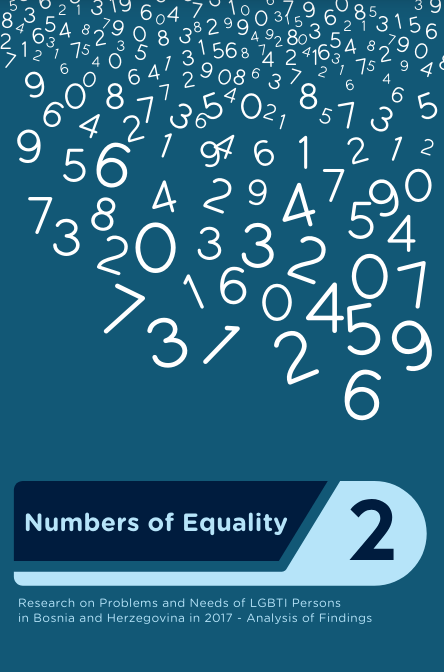Numbers of Equality 2 - Research on Problems and Needs of LGBTI Persons in Bosnia and Herzegovina in 2017 - Analysis of Findings
Numbers of Equality 2 - Research on Problems and Needs of LGBTI Persons in Bosnia and Herzegovina in 2017 - Analysis of Findings
Author(s): Amar Numanović
Contributor(s): Aida Spahić (Translator)
Subject(s): Politics, Gender Studies, Human Rights and Humanitarian Law, Family and social welfare, Politics and Identity, Identity of Collectives
Published by: Sarajevo Open Centre
Keywords: LGBTI; equality; research; BiH; statistics; violence; discrimination; same-sex unions; identity; legal position;
Summary/Abstract: Bosnia and Herzegovina (BiH) has done a very poor job in protecting and ensuring the rights and freedoms of LGBTI (lesbians, gay, bisexual, transgender and intersex) persons. That much is confirmed in the annual report of the International Lesbian, Gay, Bisexual, Trans and Intersex Association (ILGA-Europe) published in 2017 (Rainbow Europe Index 2017), that assigns the institutional and legal framework of BiH with a 31% ranking on scale of 0% (gross violations of human rights) to 100% (full respect of human rights). As for countries from the region, Croatia (62%), Montenegro (39%) and Albania (33%) all have a higher ranking, while Serbia (30%), Kosovo (30%) and Macedonia (16%) scored lower than BiH. While the legal framework for protecting the rights of LGBTI persons and ensuring their equality has been somewhat improved, hate speech, discrimination and violence against the LGBTI community are still a widespread occurrence in the society of BiH. Measures to ensure the equality of LGBTI persons were adopted through two important policies in 2015 and 2016: in late 2015 and the first quarter of 2016 governments of both entities adopted annual operational plans for the implementation of the Gender Action Plan in 2016, while the Council of Ministers of BiH adopted a one-year Anti-Discrimination Action Plan in April 2016. These policies include a number of measures designed to enhance the rights of LGBTI persons. The Law on Amendments to the Criminal Code of FBiH was also adopted in April 2016 “regulating, among other things, hate crimes committed on the grounds of sexual orientation and gender identity.” Finally, Amendments to the Anti-Discrimination Law of BiH were adopted in mid-2016. The amendments “finally introduce correct terminology by adding sexual orientation and gender identity as prohibited grounds of discrimination”, and also “include ‘sex characteristics’ as prohibited grounds of discrimination”, thereby making BiH the first country in Southeast Europe with an anti-discrimination legislative framework that protects intersex persons.4 On the other hand, fear, violence and discrimination are still part of everyday life for LGBTI persons and little has improved in this regard: in 2015, Sarajevo Open Centre documented “as many as 103 cases of hate speech and incitement to violence, 20 incidents and criminal offenses motivated by prejudice related to sexual orientation and/or gender identity.” The current, predominantly heteronormative and patriarchal social context, inundated with explicit homophobia, intolerance and violence against LGBTI persons, coupled with inadequate institutional mechanisms for protecting LGBTI rights and freedoms, has made the life of the LGBTI community much harder and considerably more limited than the rest of the population. LGTBI persons are often prevented from leading a normal life or meeting basic personal, social or cultural needs (e.g. being open about their relationships, freely expressing their gender, etc.). The results of this study indicate that fear of violence, discrimination and/or exclusion often leads to extreme forms of self-isolation, avoidance of certain cultural and social activities, reluctance to express one’s views, etc. The lives and needs of LGBTI persons are often incomparable to the quotidian life of those whose sexual orientation, gender and/or sexual identity falls neatly within the dominant and cultural matrix of the BiH society. Therefore, we decided to adopt a different approach. Unlike most studies and reports that focus primarily on the institutional and legal framework and/or social position of LGBTI persons, the study presented here aims to provide comprehensive, detailed insight into the attitudes of LGBTI persons and their outlook on everyday life, the challenges and problems before them and the real needs of the community. Although somewhat different in terms of methodology and scope of research, this study can be viewed as a continuation of Sarajevo Open Centre’s research work from 2013 when the organisation published the report “Brojevi koji ravnopravnost znače: Analiza rezultata istraživanja potreba LGBT osoba u Bosni i Hercegovini” (eng. Numbers of Life: Analysis of Results of Research on the Needs of LGBT Community in Bosnia and Herzegovina). The following section presents basic information about the methodological framework, the approach, as well as the demographic composition of the sample. The next part is dedicated to the analysis of key research results divided into ten thematic units. After that, we discuss the work of Sarajevo Open Centre, i.e. the effects of its activism. Finally, we present general recommendations drawn from this research on how to improve various aspects of the life of LGBTI persons.
Series: SOC - Ljudska prava
- E-ISBN-13: 978-9958-536-55-7
- Print-ISBN-13: 978-9958-536-55-7
- Page Count: 120
- Publication Year: 2017
- Language: English
- eBook-PDF
- Table of Content
- Introduction

